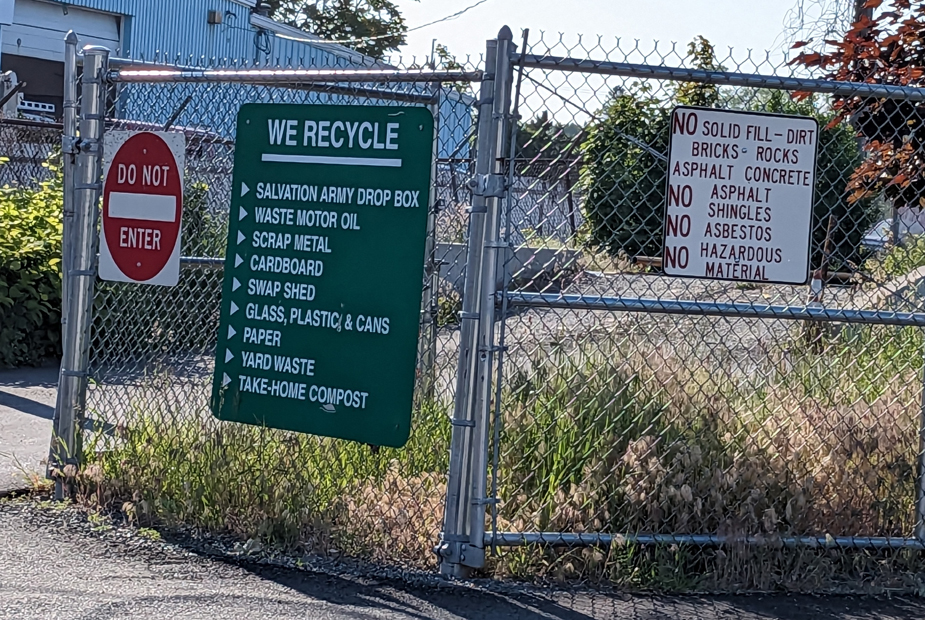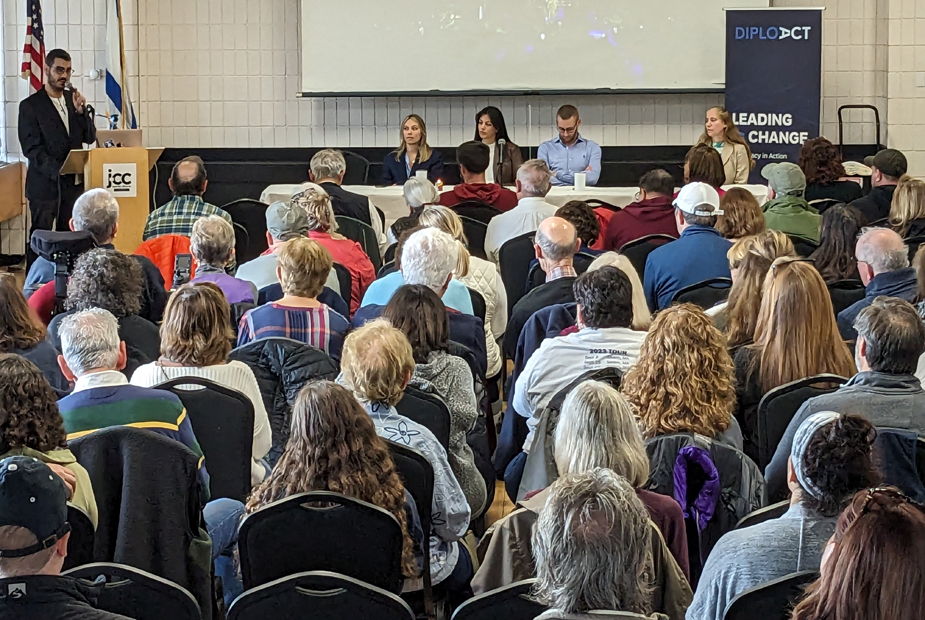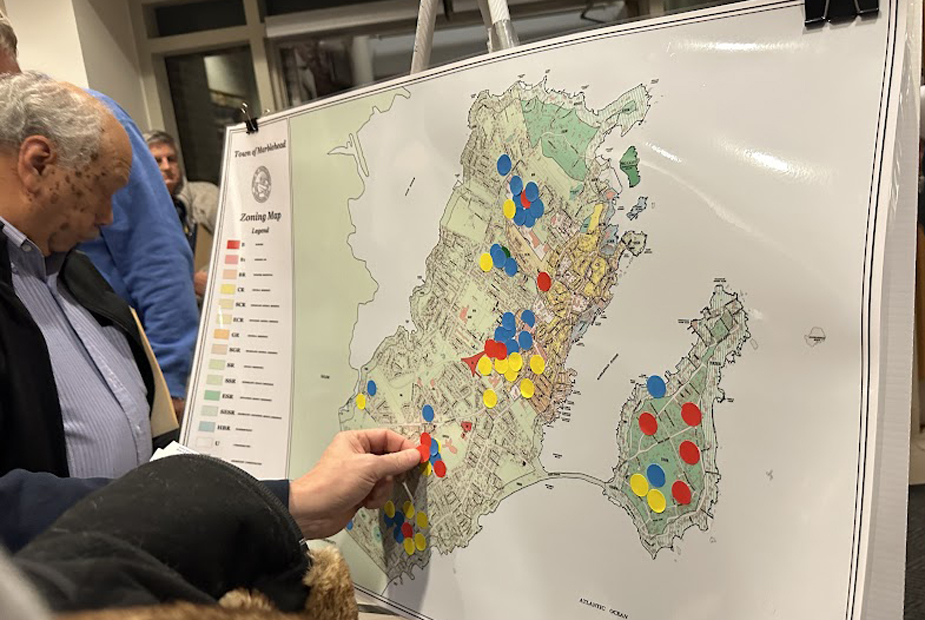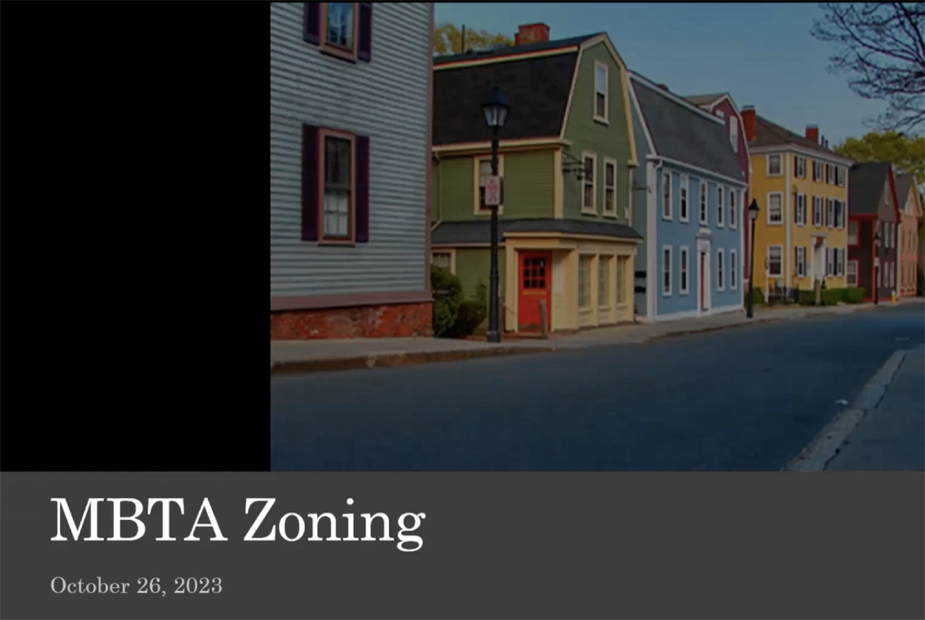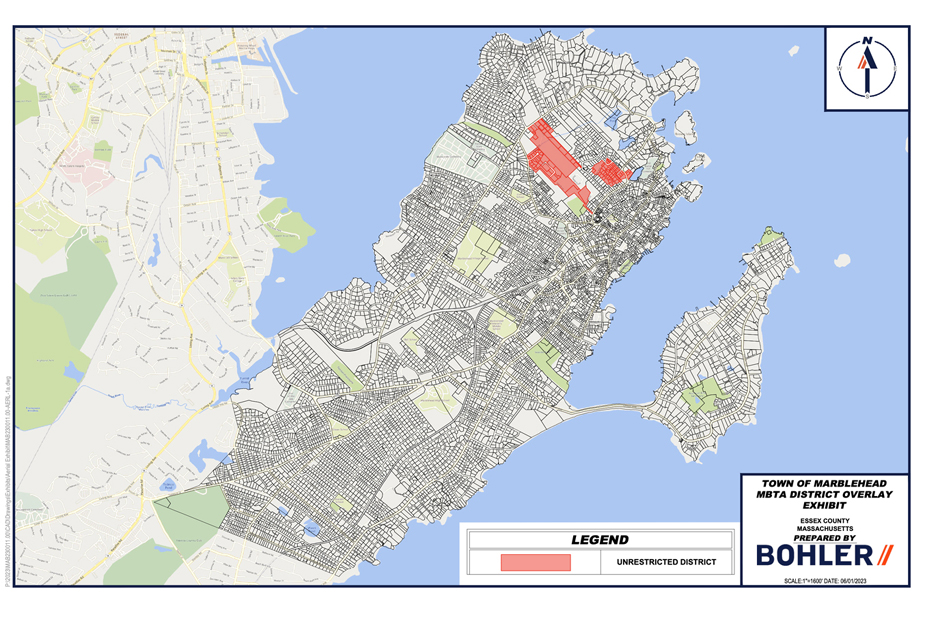BOH Perspectives: Multimillion $ Transfer Station Building Paid For But Not Delivered
Six contested races will appear on Marblehead’s June 20th ballot, along with a proposed tax override. In the Board of Health (BOH) contest, one seat is available on the three-person board, whose current members are Todd Belf-Becker, Joanne Miller, and Helaine Hazlett. Belf-Becker’s seat is up for grabs, as he is not seeking re-election. His father – David Becker (listed as David Belf Becker on the specimen ballot) – is running for his seat, as are Tom McMahon and Tom Massaro.
Marblehead Beacon sent a series of questions to all three candidates, the first of which focused on the current status and proposed plans for Marblehead’s transfer station – otherwise known as the dump – long the subject of a revolving series of financial and construction-related controversies.
The simple background story is that Marblehead’s taxpayers have approved approximately $20 million in expenditures over the past decade for the purpose of remediating the land upon which the town dump sits and building a transfer station building. To date, almost all of the money has been spent, no building has been built, and the details surrounding the expenditures, oversight of the large project, and how the decisions were made on important matters remain murky.
“The promise of a new transfer station building with a sorting floor and employee area was made almost a decade ago,” Terri Tauro, Marblehead Municipal Employees Union president and member of Marblehead’s Housing Board, told Marblehead Beacon. “The taxpayers voted twice to build the state-of-the-art facility which would increase revenue and create local jobs. My union brothers and sisters are working in sub-par conditions and jobs could be affected,” she added, pointing out that “Marblehead has had little to no new growth and the residents should be given the choice to make the station a serious revenue stream or a tax liability in years to come.”
Over the years, town officials have attributed the failure to build the $5.75 million building approved by voters in 2015 to higher-than-expected costs for remediation of the contaminated land. This was only discovered, they say, once the contractor began work. Additionally, a pipe slated to be fixed needed to be replaced, according to the contractor, and that too proved more expensive than anticipated.
In an effort to uncover the specific financial details, several private citizens have filed public records requests in recent years – and at least one was charged $1,600 by the town to access those materials. In our preliminary review of some of the provided information, BOH and Select Board meeting minutes, and our interviews, it appears that blame for the myriad problems that continued to unfold for years can potentially be attributed to the project manager, the engineering firm, the contractor, and the lack of appropriate supervision by the town. A committee that was formed to provide advice on the project was, it appears, often not consulted on fairly significant matters.
As far as Marblehead Beacon has been able to ascertain, details on the breakdown of the costs thus far – along with legal fees and terms for lawsuits, an arbitration, and a legal settlement along the way – have never been presented in any public town meeting nor accounted for transparently. Without an analysis of and ownership over what went wrong, some in the town express concern about whether poor decision-making and under-the-radar management could persist in any future projects.
The fallout of all of this is that the BOH has between $1.2 and $1.4 million remaining, not even close to enough to construct the type of building that was originally proposed. Adding to these financial woes is the fact that Marblehead is now losing substantial commercial revenue because contractors can no longer dispose of their refuse locally, since Marblehead lacks the necessary sorting floor to conform to government regulations.
Because Marblehead’s Health Director Andrew Petty and the Board of Health were and remain at the helm of dump-related projects, Marblehead Beacon asked the BOH candidates the following:
What is your perspective on the current status of the transfer station? The Board of Health has obtained a total of $20 million through several override votes over the past decade, but the promised upgrades – including a new building that was specifically mentioned in one of the override questions – have not been completed, and most of the money has been spent. What do you propose to do going forward? What is your position on the fact that the lack of a sorting floor in Marblehead means contractors are taking their trash elsewhere? If Marblehead does not plan to put a sorting floor in place, how do you propose making up the lost revenue that contractors are now taking to other communities? Would you favor asking for a portion of the federal government ARPA money to fund what needs to be done at the Transfer Station? Would you support implementing pay-as-you-throw in Marblehead to raise additional revenue?
Their responses, in alphabetical order, appear below:
David Becker
We need to educate the public about the history and evolution of the transfer station project. In order to serve the town properly, leadership has to be able to adapt to whatever is thrown at them. I was on the Board when we were mandated by the DEP to cap the landfill. After town meeting and the voters approved an override to cover state mandates, remediation costs skyrocketed when our engineering contractor discovered greater than expected contamination on the site and in abutting properties, including conservation land. Because of the due diligence of the Board of Health the additions had to be addressed and had to be covered by the approved funds. An attempt was made to get more funds so that the project could go on with the original design, but this subsequent override was not passed by the voters. I admire how well the Board and its administrator have been able to devise a recovery plan with existing funds that will still be able to provide a functioning facility and a modern building for the employees. Marblehead will still have a modern transfer station that provides great service for its residents and still will provide service for local commercial use. It is and will be the envy of many communities that do not have this kind of facility. I know this is and will be a facility that makes the community proud.
Being a Board member, your purpose is not to find fault for everything, your responsibility is to find solutions. We should all work together to equitable means for the benefit of the town as a whole.
As to your reference to ARPA money, you should know that there is a working committee of experts in the various fields that has been thoroughly studying the distribution and use of these funds for the maximum benefit of all facets of life in Marblehead. And as to your reference to utilization of pay as you throw as a source of income, it was resoundingly unpopular 20 years ago. It is an extremely regressive burden on the less affluent townspeople.
Tom Massaro
The current status of the transfer station: The Transfer Station is an important component in the services provided by the Board of Health. Its value is undeniable. At the same time, however, its failure to stay within projected budgets for its upgrade and expansion is disconcerting. I have not been here long enough to have lived through the entire history of the project. Unfortunately, there is no single source of all the details, but if elected to the Board I will try to create such a document to encourage a broader understanding of the issues and a more objective assessment of the future.
From what I understand, early engineering analyses missed some important work areas. That led to additional expenditures for cleanup and required a diversion of funds originally scheduled for building construction and campus redesign to pay for that work. Public meetings were held to consider the consequences of the diversion. The participants at those meetings voted to reduce the size of the building rather than ask for additional funds to maintain the original size. I also understand that size of the sorting floor has been reduced but the sorting service was not eliminated. I am inclined to support that plan, but I am also open to other options that might be presented.
I was at the most recent Board of Health meeting where the Director reported some positive activity. He indicated that Town will be receiving permission from the Massachusetts Department of Environmental Protection to allow the Transfer Station to increase its processing of commercial waste especially construction material. That permission should help maintain the revenue stream of the Transfer Center for the near future.
An additional conversation at that meeting, however, puts all of this in perspective. In contrast to previous years when we were paid for recycled cardboard, the Transfer Center must now pay $90 a ton to have it removed. With other MA landfills being closed and the revenue from recycling decreasing, the Town can expect ongoing pressure on the Transfer Station. The Board must continue to monitor the economics of the Station closely.
My view is that dwelling on the past adds little value. It is a bit disappointing, but we are where we are. Our discussions should be focused on solutions. Effective management of the Transfer Center is primarily a problem of engineering logistics. As former engineering professor, I am well equipped to participate in that effort. It is ironic that my undergraduate thesis in chemical engineering at MIT decades ago was on a solid waste management problem, and if I am elected to the Board, one of the first things I will do after returning to Massachusetts is to work on upgrading an existing waste management facility.
I do not favor using ARPA funds for the Transfer Station, but I would be willing to consider a “pay as you throw” concept if some accommodations were made for the poorest families in the community. I experienced such a program in my former home in Charlottesville for years, and I had no problem with it.
Tom McMahon
In short, the transfer station project was a failure from the perspective of transparency, project management, and execution, but this is not news to most residents. The question most residents have is, “what happened to the money?” In 2011 Marblehead was sold on the idea of a new transfer station design that would take into account Massachusetts evolving regulations and keep our transfer station “revenue generating.” This revenue generation, primarily from contractors, of about $1 million is an important offset to our disposal costs from curbside trash pick-up/transfer station site removal which currently comes in at roughly $1.5 million.
As Massachusetts is running out of landfill space MassDep is already ramping up recycling efforts by pushing contractors to dump construction and demo materials at transfer stations that have “sorting floors.” A sorting floor allows the transfer station to separate these materials so that they can be taken by the state and recycled. The process is done through a ‘weigh and pay’ system similar to what we have now. Marblehead’s original design included a sorting floor which clearly was not completed due to what could be described as poor project management.
In 2015 residents were asked for roughly $6 million in additional funds to finish the original design in what the health director referred to as the only way to keep the transfer station “revenue generating.” Again, no sorting floor or transfer station building and no explanation as to what went wrong. Through lawsuits Marblehead was able to recoup a little over $1 million dollars and last summer the board was presented with 2 designs to complete the project, one similar to the original with a sorting floor and another that would basically put a facelift on the pit and build a small office for workers. The original design would have required an ask of an additional $5-6 million from the town while the “facelift” is believed to be able to be completed with roughly $1.5 million in the revolving fund. The board went with the second design in what the chair referred to at town meeting as a way to “not burden the residents with more taxes.” His statement is not correct though. As of November 2022, local contractors trying to dispose of construction and demo materials at our transfer station are being turned away and forced to go to Peabody and Georgetown transfer stations that have sorting floors for these materials. That’s lost revenue right there.
This is only the start though. Regulations will increase in this area and through conversations I had with MassDep their goal for transfer stations like Marblehead is to only serve residents and not commercial entities. Estimates are that commercial entities make up about 80% of the current revenue. So while the board chair suggested he wouldn’t burden the residents with increased taxes for this project he neglected to mention that by not completing the original project we subject ourselves to having to make up the lost revenue to cover our cost of trash pickup and disposal, which would likely have to be done through a general override.
What I propose going forward is that the board immediately pauses the project. We then build a better committee with stakeholders including transfer station workers, end users (contractors), residents of Green St./Arnold Terrace, local engineers with deep knowledge of this project (yes we have those), and members of successful committees that stayed within budget, or came in below, and delivered on their promises. The 2 designs from summer 2022 should be reviewed by this committee with adjustments made as needed. Finally, both projects need to be presented to the town where the residents are given a full understanding of the costs of each but most importantly the financial consequences and benefits of each.
The Marblehead residents were twice promised a transfer station design, they agreed, fronted the costs, and were not delivered what was promised. Therefore, only the Marblehead residents should decide how we move forward through full transparency. My opinion is that we need the sorting floor. I think it's imperative to keep the transfer station revenue generating to avoid a general override in order to cover our curbside pickup / disposal costs. My belief is also that if we are one of the few transfer stations with a sorting floor that our revenue will increase more than it is now and any surplus money could be put in the general fund to help offset any other town costs and help avoid raising taxes in the future. Giving more money for this project is a tough pill for any resident to swallow based on the failure thus far, I get that, but it's for the residents to decide once they are provided all the necessary information to make an informed decision.
With regards to how we would make up any lost revenue to cover our costs I believe it comes down to one of two options, general override or “pay as you throw.” I do not support “pay as you throw” as it has been shown to be wildly unpopular in other towns but also I believe this idea was previously shot down by Marblehead residents by a wide margin when brought up in the past. The failure of this project has dug Marblehead into a tough hole where I wish there were better options. I’m not seeing them now but I’m always open to suggestions from residents.
Would I be in favor of asking for a portion of the remaining ARPA funds for the project? Sure. The completion of this project is a one-time expense and that’s what ARPA funds are designed for. However, I still believe the residents need to decide even that portion. There has been a lack of input on ARPA funds use by residents so I think even that would need to be included in the vote.

